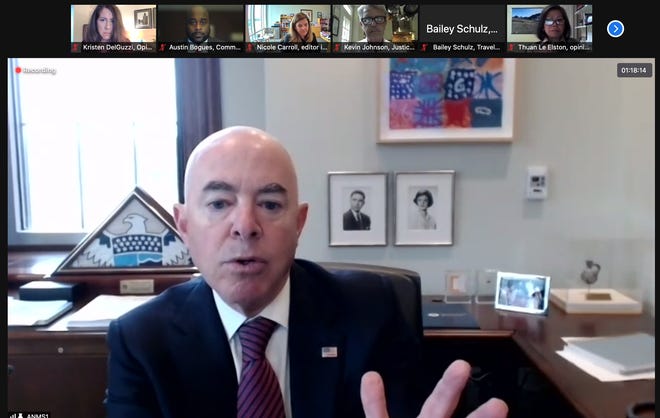
If you've lived or worked along the border – or paid any attention at all to border and immigration policy – it did not come as a surprise to you that the Biden administration released a new set of guidelines for detaining and removing people in the country illegally.
I have done all three: I grew up on the border. Was a border reporter. And served as politics editor.
So it was with great interest that I sat in on an interview with the one person who could talk about what the country’s immigration enforcement policy is and why it’s needed.
Homeland Security Secretary Alejandro Mayorkas met with the USA TODAY Editorial Board on Tuesday to discuss just that as part of a sweeping conversation about where the powerful department continues to remake itself in President Joe Biden's image and break away from Donald Trump's.
Mayorkas started the conversation by getting into his vision of how DHS will enforce immigration law, which boils down to the idea that being in the country illegally is no longer enough to get a person deported.

Random and whimsical policy
He made sure to point out that the new guidelines are not entirely due to the fact that there are an estimated 11 million undocumented immigrants living in the United States and about 20,000 Border Patrol agents. The new approach, he said, is needed if he has any chance of changing the culture of the department and how that department is perceived. A huge part of that will be being more strategic about who gets deported, instead of just removing everybody.
'What keeps me up at night? Everything': Homeland Security Secretary Mayorkas to USA TODAY
“Even if I had the resources to do so, I wouldn’t do so,” Mayorkas said. “And that is going to require a sea change, and I embrace that opportunity.”
Listening to him talk about the policies and his vision for how the country deports immigrants, I couldn't help but realize one fact about those guidelines: Here is the absolute truth about this country’s immigration policy. For better or worse, it is random and whimsical. This is true for many reasons. But the biggest is that our nation’s immigration policy and how we treat immigrants and refugees is entirely dependent on who the president is and what they feel is the right thing to do.
Yes, the impact is felt long after the president is replaced. We're still helping families heal after being separated. But that impact lives on in the wake of a new set of possibly destructive rules.
More:What happened to 'Honest Joe'? President Joe Biden's promises are turning into lies.
Don’t believe me? Let’s look at recent history. The Obama administration decided to focus on people in the country illegally who also had committed certain crimes or who were a threat to public safety in some way. Being in the country illegally wasn’t enough to get automatically removed.
Exit Barack Obama. Enter Trump. For those four tumultuous years, just existing was enough to get people removed. Of course, President Trump took things despicably further by also separating families at the border then proceeding to lose children.
Side note: If you're still saying President Obama separated families, no, he didn’t.
But, OK. American voters spoke during this past election and Trump was removed in a less-than-peaceful transfer of power.
Enter Biden. Putting aside how long it has taken for this president to seemingly take the border crisis seriously, we do finally have some kind of framework for what to expect.
Opinions in your inbox: Get a digest of our takes on current events every morning
What was finally announced last week was a new set of guidelines for all Immigration and Customs Enforcement agents to follow. Essentially, the country is back to a more Obama-like way of enforcing immigration laws.
The guidelines,which take effect at the end of November to give time for training, leave room for agents and officers to focus on people who are believed to be a threat to national security. Mayorkas says he's relying on the discretion of agents to make the right call.
Now, remember, this is the same agency that not one year ago was ripping people from families and removing immigrants who were just living their lives. It was a brutal deportation policy that rippled through the country and created a wave of distrust and animosity toward DHS and ICE.
Those same agents, who became the face of Trump’s policy, are now being asked to do their jobs in wholly different ways.
Mayorkas acknowledged the distrust and anger that resulted from Trump’s policies and how ICE did its business.
“I very well know that skepticism is earned,” he said. “And that it’s earned over many years. But I also understand that if meaningful change is going to be accomplished, one does not accomplish it through containment, cabining people's authority, but rather through guiding, training, supervising, measuring and holding accountable a workforce.”
Basically, he’s saying the agencies involved will follow through and implement the guidelines in a more humane way because his department will make sure of it.
Don't worry, it will change again soon
Why does this even matter? Why does it matter that policy changes whenever the presidency does? Why does it matter that agents now have to do things differently and that immigrants have to live their lives differently?
It’s because in the middle of these institutional changes are communities and people who have to live with these changes. Regardless of where you fall on the immigration issue, this changes the lives of people who are either passionate about the topic or are directly impacted.
Do you hate immigrants and want them all removed? This new policy is something you can be angry about. Do you think the Trump policy was founded on hate and will ultimately go down as the most inhumane border policy in recent memory? Mayorkas' new guidelines will likely give a guarded sense of relief.
Either way, that will change in a couple of years. And either way, the communities that live with the immigration policies and the people who work to change them will have to adjust again.
Either way, and this is my point, the nation’s immigration and national security policies will pivot dramatically again when we get a new president.
I guess I’m reminding Mayorkas that while his new rules might very well be better for everybody involved and go further toward balancing treating people humanely while still enforcing the law, the sea change he’s trying to create will one day shift again.
And it will be the communities on the border, immigrants and others in that corner of the national conversation who will again have to weather that change.
Louie Villalobos is USA TODAY'S opinion audience development editor and a member of the Editorial Board.

Source link








